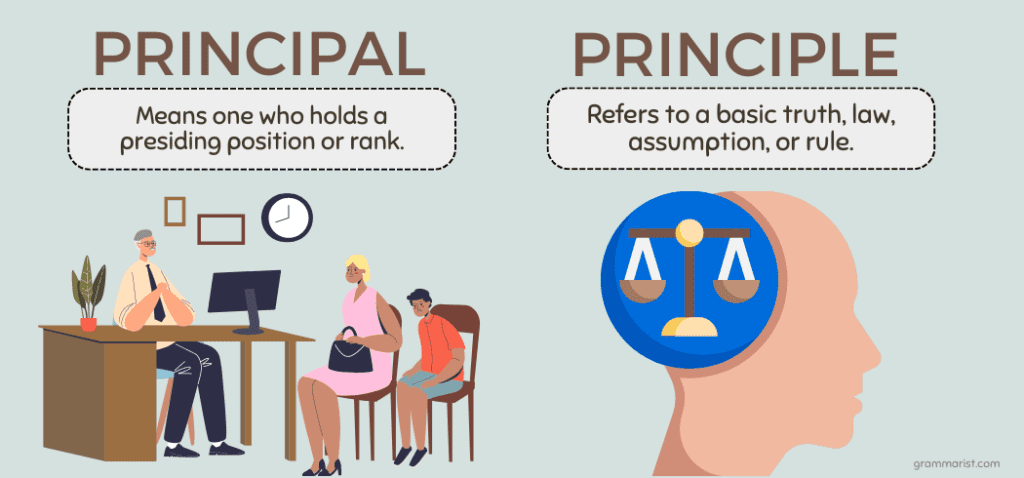Homophones, words that sound the same but are spelled differently and mean different things, are very confusing to English language learners. These words are often misused in writing, which can further frustrate your readers if they are uncertain about what you are trying to convey.
Principle vs. principal are perfect examples of this. Pronounced the same, they have very different meanings. One of these words can even be used in more than one part of speech.
Let’s learn what each word means and some tricks to help you always remember their correct usage.
What Is the Difference Between Principal and Principle?

Homophones are some of the trickiest words for people learning how to write. When used in speech, their context and presentation make their meaning clear. But if you happen to use the wrong spelling in your writing, you can easily confuse your reader, who may have to guess its use.
As a noun, principal means one who holds a presiding position or rank. In its adjectival form, principal means first, important, or original.
For example:
- Principal Scott is one of the fairest and most trustworthy advisors in our school.
- The principal grammar rule is ensuring your writing makes sense to your reader.
Principle is also a noun, but it refers to a basic truth, law, assumption, or rule. It is often used as a synonym for the concept of morality, which relates to acceptable conduct or the distinction between societal right and wrong.
For example:
- The literary principles associated with classic authors surrounded their personal reflections of the times within their publications.
- Before donating slightly used clothing, she always made sure to check in with the local shelter on moral principles.
The Roots of Principal and Principle
Part of the confusion behind these words is the Latin root, princip, which means “first” or “chief.” They both entered into English through Old French adaptations of the original Latin principalis (principal), meaning first, and principium (principle), meaning source.
Their similarities in this aspect can be quite confusing, and combined with their exact pronunciation, their use is a frustrating experience.
How to Use Principal
To remember the use of principal, look at the last three letters: pal. A pal is a friend or comrade of sorts, and if you can remember your principal is “a pal,” you can remember that this noun refers specifically to a person, not a reference to truth or law.
For example:
- We called the office to discuss the new curriculum ideas with the school principal.
- We had to file a complaint with the principal of human affairs concerning the time card discrepancy.
Principal is also the only word of the two that can be used as an adjective to modify a noun. As an adjective, it provides an added description to emphasize the importance.
For example:
- The art museum displayed the principal watercolor and pencil sketches that she later completed as murals for wealthy clients.
- It wasn’t hard to discern which of the principal blueprints were eventually used for the finished architectural projects.
How to Use Principle
Although principle is a noun, it does not refer to a person – only an abstract law, assumption, or rule.
For example:
- The handbook explicitly outlined the office dress code expectations, and the same fundamental principles applied to all work-related conferences and off-site meetings.
- It is a matter of principle to accept all people from all walks of life as welcome members of society.
Let’s Review
Although they may sound the same and have the same Latin root, principal and principle are two very different words. Principal (remember, your principal is your pal) is a noun that describes a person in a position of authority or that comes first. It also is an adjective to highlight the importance of something that is first.
Principle is a rule or law and can be used in a synonymous manner to explain moral beliefs or understanding.

Comments are closed.